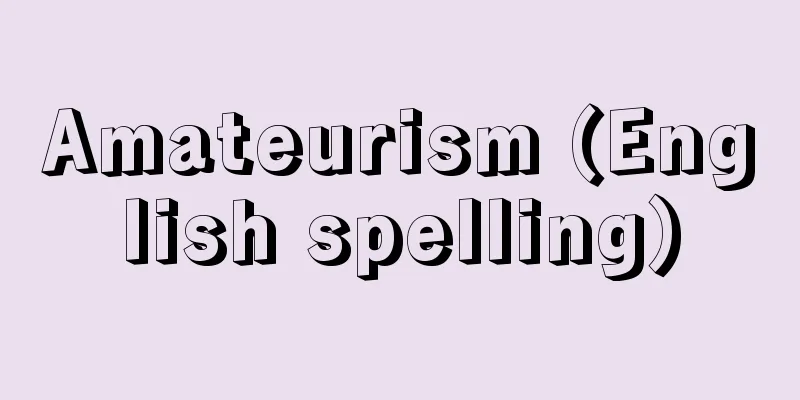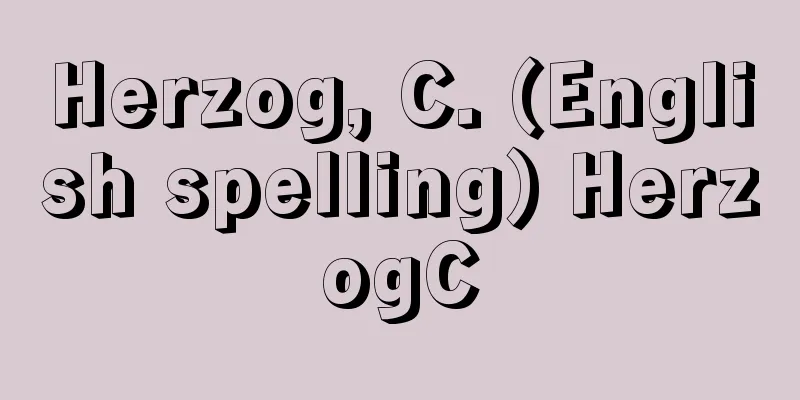Amateurism (English spelling)

|
A term used mainly in the sports world, it refers to the philosophy that is the basis of amateur sports. An amateur is someone who does not compete for rewards, but rather enjoys sports as a hobby and is a pure lover of sports, and amateurism is the principle that emphasizes this spirit. [Tetsunosuke Onishi] EtymologyThe word amateur comes from the Latin word amator (enthusiast), and came to be used together with the word sport (enjoyment away from work). In the 18th century sports world, the term gentleman was used as a synonym for amateur, and at that time, if you were not a gentleman, you were not an amateur. [Tetsunosuke Onishi] historyThe word amateur was first used in a sporting context at the Henley Royal Regatta, a boat race held in England in 1839. Although not codified, the eligibility requirements established at that time were the world's first amateur regulations. The rules were codified at the British Athletics Championships in 1866. The rules excluded from amateurs those who made a living from sports and all professional workers, and in Britain, where class consciousness was strong, the accepted social idea at the time was that sports were something only the upper classes could do. Meanwhile, across the ocean in America, rules for participation in amateur athletics were decided in 1868. This was due to the need to clearly distinguish between professional and non-professional athletes due to the founding and development of professional baseball, and the increase in large prize money and gambling, but unlike Britain, the rules did not exclude the working class. As the social status of workers in Britain gradually improved, the way to participate in sports was opened up to workers, and sports progressed to the popularization of sports. [Tetsunosuke Onishi] Amateur RulesThe first time amateur regulations were adopted in Japan was in 1911 (Meiji 44), when the Dai-Nippon Taiiku Kyokai (now the Japan Sports Association) decided the eligibility requirements for athletes taking part in the qualifiers for the 5th Olympic Games to be held in Stockholm. In the track and field competition in 1917 (Taisho 6), rickshaw drivers, postal workers and milkmen were excluded from participation as they were ineligible, which caused problems. The International Olympic Committee (IOC) also created its first common regulations for all sports events in 1901. The contents of the regulations were as follows: (1) Those who play for money, (2) those who play with professionals, and (3) those who receive money as gymnastics teachers or trainers are not recognized as amateurs. At the time, there were very few cases of violations of the amateur regulations, but this regulation was applied to Jim Thorpe (1888-1953), an American who won the decathlon at the 1912 Olympics, and he was stripped of his gold medal. [Tetsunosuke Onishi] Current StatusThe tradition of amateurism, however, was no longer able to cope with the changing social situation and the improvement of the sporting standard after 1945, and eventually moved in the direction of relaxation. Cricket abolished its amateur rules in 1962, and Wimbledon tennis was opened to professionals in 1968. One of the reasons for this relaxation of rules was the economic problems of the athletes. In socialist countries, which were forced to guarantee the economic livelihood of athletes, state-trained athletes (state amateurs) appeared, and in the United States and other countries, athletes who play sports with scholarships (scholarship amateurs), and in many capitalist countries, athletes who receive support from sponsors and companies and are used for advertising in return (commercial amateurs) were born. The current IOC sets minimum eligibility requirements, but amateur regulations are said to be based on the provisions set by the International Federations (IFs) for each sport. However, since the amateur regulations of each IF differ, approval from the IOC is required for the Olympic Games. Furthermore, decisions on eligibility to participate are left to each country's NOC (National Olympic Committee), making it increasingly difficult to distinguish between amateurs and professionals in countries with different social systems. In the future, it is likely that various changes will occur in each sport, the Olympics, and in the way people around the world think about sports. However, even if the amateur regulations disappear, the words of mountaineer Hillary, who said, "I want to be an amateur in spirit and a professional in technique," should remain a guidepost in the hearts of all sportsmen. [Tetsunosuke Onishi] Source: Shogakukan Encyclopedia Nipponica About Encyclopedia Nipponica Information | Legend |
|
おもにスポーツ界の用語で、アマチュア・スポーツの根幹をなす考え方。報酬を目的に競技するのではなく、趣味として楽しみながら、純粋にスポーツを愛好する人をアマチュアといい、その精神のあり方を強調する主義のことをアマチュアリズムという。 [大西鉄之祐] 語源アマチュアamateurは、ラテン語のamator(愛好家)という語に由来し、スポートsport(職場を離れて楽しむ)の語とともに用いられるようになった。18世紀のスポーツ界ではジェントルマンという用語がアマチュアと同義語として使われており、当時はジェントルマンでなければアマチュアでないとされた。 [大西鉄之祐] 歴史アマチュアということばがスポーツに初めて取り入れられたのは、1839年にイギリスで行われたボートレースのヘンリー・ロイヤル・レガッタである。成文化こそされなかったが、このとき決められた参加資格が世界で初めてのアマチュア規定であった。 規定が成文化されたのは1866年イギリスの陸上競技選手権大会である。その内容は、スポーツによって生計を営む者と、職業をもつすべての労働者をアマチュアから締め出すものであり、階級意識の強いイギリスでは、スポーツは上流階級の人々同士で行うものというのが、当時の社会通念であった。一方、海を越えたアメリカでは、1868年アマチュア競技会への参加規定が決められた。これは、プロ野球の創設発展、多額の賞金や賭博(とばく)行為の増加などによって、プロフェッショナルprofessionalな競技者との区別を明確化する必要に迫られたからであったが、イギリスのように労働者階級を排除する内容はなかった。イギリスでも徐々に労働者の社会的地位が向上するにしたがい、労働者にもスポーツに参加する道が開かれるようになって、スポーツは大衆化へと進んでいった。 [大西鉄之祐] アマチュア規定日本で初めてアマチュア規定が採用されたのは、1911年(明治44)大日本体育協会(現、日本スポーツ協会)が、ストックホルムで開催される第5回オリンピック大会の予選に参加する選手の出場資格を決めたときである。1917年(大正6)の陸上競技大会では、人力車夫、郵便・牛乳配達人には参加資格がないとして除外し、問題が起こった。 IOC(国際オリンピック委員会)でも1901年に初めて各競技種目共通の規定をつくった。その内容は次のとおりである。(1)金銭のためにプレーする者、(2)プロといっしょにプレーする者、(3)体操教師もしくはトレーナーとして金銭を受ける者、これらの者はアマチュアとして認めていない。当時、アマチュア規定に違反する事件はごく少なかったが、1912年のオリンピックで十種競技に優勝したアメリカのジム・ソープJim Thorpe(1888―1953)はこの規定が適用され、金メダルを剥奪(はくだつ)された。 [大西鉄之祐] 現況アマチュアリズムの伝統も、1945年以降、流動する社会情勢やスポーツ水準の向上などによって、昔からの考え方では対応しきれなくなり、ついには緩和の方向へと進み、1962年にはクリケットがアマチュア規定を廃止し、1968年にはテニスのウィンブルドン大会がプロフェッショナルにも開放された。このように規定が緩和に向かった原因の一つに、選手の経済問題があげられる。競技者の経済生活を補償する必要に迫られた社会主義国では、国家が養成する選手(ステート・アマチュア)が登場し、アメリカなどのように奨学金によってスポーツに励む選手(スカラシップ・アマチュア)や、多くの資本主義国でみられる、スポンサーや企業の援助を受けながら、その代償として宣伝に使われる選手(コマーシャル・アマチュア)が誕生した。現在のIOCでは最小限の参加資格を定めているが、アマチュア規定は各種目別国際競技連盟(IF)の定める条項によるとされている。ただ、IFのアマ規定はそれぞれ差異があるため、オリンピック大会ではIOCの承認を得なければならない。さらに参加資格の決定は、各国のNOC(国内オリンピック委員会)に委嘱されており、社会体制の異なる各国間でのアマ、プロの区別はいよいよ困難になってきている。 今後、各競技やオリンピック、さらに世界の人々のスポーツに対する考え方に、さまざまな変化が生まれるだろうと思われる。しかし、たとえアマ規定が消滅することがあっても、「精神的にはアマチュアで、技術的にはプロフェッショナルでありたい」と語った登山家ヒラリーのことばは、すべてのスポーツマンの胸に生き続けてほしい道標である。 [大西鉄之祐] 出典 小学館 日本大百科全書(ニッポニカ)日本大百科全書(ニッポニカ)について 情報 | 凡例 |
>>: Amateur Radio - Amateur Radio
Recommend
Nojiri [town] - Nojiri
A former town in Nishimorokata County in the south...
Hacchogane - Hacchogane
A type of street performance. Young men wear eight...
Yoshiaki Mogami
Year of death: January 18, 1614 (February 26, 1614...
Devaraja (English spelling)
The idea of a god-king, originating from India, ...
Kenpeki Seiya (English spelling)
A defensive tactic that was used for a long time i...
Portamento (English spelling) portamento Italian
A technique in Western music. It is a technique f...
Metallophone - Tekkin (English spelling) glockenspiel
Also known as a glockenspiel, it is an idiophone ...
Open market operations
Open market operations, also called open market o...
Business card - meishi
A small piece of paper on which is written the na...
Diomedeidae
…Any of the birds in the Diomedeidae family, or a...
Oberon - Oberon
…Opera is at the pinnacle of his career, while re...
Nyukawa [village] - Nyukawa
A village in Ono County, northeastern Gifu Prefect...
Kakki Dance - Duck Dance
…In places where Furyu-odori is used to ward off ...
Kakurinji Temple
A Tendai sect temple located in Kitazaike, Kakoga...
Shrieking sixties (English spelling) Shrieking sixties
...In the Northern Hemisphere, there are many con...









